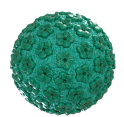Help Protect Your Child from certain hpv related cancers
For most people, HPV clears on its own. But for those who don't clear the virus, it can cause certain cancers and diseases. As a parent, your child's health and safety is of the utmost importance. Which is why we’re dedicated to educating parents on the importance of the HPV vaccine, right from the age of 9 years.
Learn how HPV vaccination for children and teens can help protect against HPV-related cancers.

HPV and Its Attributable Cancers Go Hand in Hand

Cervical cancer is the 2nd-most common cancer in women.

Every 5 minutes, nearly 1 patient loses their life due to an HPV-related cancer
1 out of 13 cancers reported in India is HPV-related.

Over 80% of sexually active men and women can be exposed to HPV at some point in their life.

Major global and Indian medical bodies recommend HPV vaccination for children aged 9+
World Health Organization (WHO)
Indian Academy of Pediatrics (IAP)
American Academy of Pediatrics (AAP)
Centers for Disease Control and Prevention (CDC)
Early HPV vaccination significantly reduces the lifetime risk of cervical cancer
The HPV vaccine can help prevent approximately prevent many HPV-related cancers worldwide.
Vaccination before first sexual contact gives the good protection.
Don’t Fall for these myths
Consider HPV Vaccination for Your Child
Consider HPV Vaccinati
on for Your Child

Considering protecting your child from certain HPV infections is more than just a choice. It can help prevent the risk of certain HPV-related cancers and diseases. Consult with your healthcare provider to schedule your child’s HPV vaccination today.
ccination for your child.
Frequently Asked Questions
Why does my daughter need the HPV vaccine?
Do boys also need the HPV vaccine?
At what age should my daughter or son get the HPV vaccine?
Can kids get HPV?
Is the vaccine safe for children?
Are there any side effects of the HPV vaccine?
How long does the HPV vaccine protection last?


